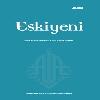William James’in Mistik Tecrübe Tahlili Fenomenolojik mi Yoksa Felsefi midir?
William James, Mistik Tecrübe, Bilinç Durumu, Dini Tecrübe, Dini Fenomenoloji
Is William James’s Analysis of Mystic Experience Phenomenological or Philosophical?
Philosophy of Religion William James, Mystical Experience, State of Consciousness, Religious Experience, Religious Phenomenology,
___
- Bouyer, Louis. “Mysticism: An Essay on the History of the Word”. Understanding Mysticism. ed. Richard Woods. London: The Athlone Press, 1981.
- Wikisource, en.wikisource. “The Hidden Self”. Erişim 10 Ocak 2021. https://en.wikisource.org/wiki/ The_Hidden_Self
- Fergusson, David - Snow, Katherine. “What Provides a Better Explanation for the Origin of the Uni-verse: Science or Religion”. Philosophy, Science and Religion for Everyone. ed. Mark Harris, vd. London: Routledge, 2017.
- Gellman, Jerome, “Mysticism”. The Stanford Encyclopedia of Philosophy (Summer 2019 Edition). ed. Edward N. Zalta. Erişim 8 Ocak 2021. https://plato.stanford.edu/archives/sum2019/entries/mysticism/
- Haydon, Eustace. “The significance of Mystic’s Experience”. The Journal of Religion 2/2 (Mar. 1922), 179-189.
- Hollinger, David A. ““Damned for God’s Glory” William James and the Scientific Vindication of Pro-testant Culture”. William James, and a Science of Religions: Reexperiencing The Varieties of Religi-ous Experience. ed. Wayne Proudfoot. New York: Columbia University Press, 2004.
- İkbal, Muhammed. İslâm’da Dini Düşüncenin Yeniden İnşâsı. çev. Rahim Acar. İstanbul: Timaş Yayınları, 2013.
- James, William. “A Suggestion About Mysticism”. The Journal of Philosophy, Psychology and Scientific Methods 7/4 (Feb. 1910), 85-97. https://doi.org/10.2307/2011271
- James, William. Dinsel Deneyimin Çeşitleri: İnsan Doğası Üzerine Bir İnceleme. çev. İsmail Hakkı Yılmaz. İstanbul: Pinhan Yay., 2017.
- James, William. “Great Men, Great Thoughts, and the Environment”. Philosophy After Darwin: Classic and Contemporary Readings. ed. Michael Ruse. Princeton: Princeton University Press, 2009.
- James, William. “Is Life Worth Living”. The Will to Believe: And Other Essay in Popular Philosophy. Camb-ridge: Cambridge University Press, 2004.
- James, William. “Philosophical Conceptions and Practical Results”. University Chronicle 1/4 (1898), 287-309.
- James, William. “Pluralistik Universe”. William James Writings 1902 1910. ed. Bruce Kuklic. New York: Literary Classics of the United, 1987.
- James, William. “The Knowing of Things Together”. The Psychological Review 2/2 (1985), 105-24. https://doi.org/10.1037/h0073221
- James, William. “What is an Emotion?”. Mind 9/34 (1884), 188-205. https://doi.org/10.1093/ mind/os-IX.34.188
- James, William. “What Psychical Research Has Accomplished”. Will To Believe: And Other Essay in Popular Philosophy. Cambridge: Cambridge University Press, 2004. https://doi.org/10.1177/095715 4X12450138
- James, William. Pragmatizm: Bazı Eski Düşünme Tarzları İçin Yeni Bir Ad. çev. Ferit Burak Aydar. İstan-bul: İş Bankası Yayınları, 2011.
- James, William. Psychology, Briefer Course. Cambridge: Harvard University Press, 1984.
- James, William. The Principles of Psychology. 1.Cilt. Harvard: Harvard University Press, 2007.
- James, William. The Varieties of Religious Experience: A Study in Human Nature. New York: Penguin Books, 1985.
- Katz, Steven T. “The ‘Conservative’ Character of Mystical Experience”. Mysticism and Religious Traditi-ons. ed. Steven T. Katz. 3-60. New York: Oxford University Press, 1983.
- Katz, Steven T. “Language, Epistemology and Mysticism”. Mysticism and Philosophical Analysis. ed. Steven T. Katz. 22-74. Oxford University Press, New York, 1978.
- Kingsland, William. An Anthology Mysticism and Mystical Philosophy. London: Methuen and Co. 1927.
- Lamberth, David C. William James and the Metaphysics of Experience. Cambridge: Cambridge University Press, 1999.
- Levy-Bruhl, Lucien. İlkel Dinlerde Mistik Deneyim ve Simgeler. çev. Oğuz Adanır. İstanbul: Doğu Batı Yay., 2006.
- Meierdiercks M. L. L.-Snarey J.R. “James, William and the Phenomenology of Religious Experience”. Encyclopedia of Psychology and Religion. ed. Leeming D. (Springer, Berlin, Heidelberg, 2019). Eri-şim 5 Ocak 2021. https://link.springer.com/referenceworkentry/10.1007%2F978-3-030-24348-7_200207
- O’Hear, Anthony. Experience, Explanation and Faith: An Introduction to the Philosophy of Religion. Londra: Routledge & Kegan Paul, 1984. https://doi.org/10.4324/9780203532638
- Richardson, Robert D. William James in the Maelstrom of American Modernism: A Biography. Boston: Kahle/Austin Foundation, 2006.
- Russell, Bertnard. Din ile Bilim. çev. Akşit Göktürk. İstanbul: Elif Yayınları, 1963.
- Schmidt, Leigh Eric. “The Making of Modern “Mysticism”. Journal of the American Academy of Religion 71/2 (June 2003), 273–302. https://doi.org/10.1093/jaar/71.2.273
- Sinanoğlu, Suat. “μύω” Maddesi. Yunanca - Türkçe Sözlük. Ankara: Anakara Üniversitesi Dil ve Tarih-Coğrafya Fakültesi, 1953.
- Stace, Walter T. Mistisizm ve Felsefe. çev. Abdüllatif Tüzer. İstanbul: İnsan Yayınları, 2004.
- Taves, Ann. “The Fragmentation of Consciousness and The Varieties of Religious Experience: William James’s Contribution to a Theory of Religion”. William James, and a Science of Religions Reexpe-riencing The Varieties of Religious Experience. ed. Wayne Proudfoot. 48-72. New York: Columbia University Press, 2004. https://doi.org/10.7312/prou13204
- Taylor, Eugene. William James on Consciousness Beyond the Margin. Princeton: Princeton University Press, 1996.
- Türer, Celal. “William James’ten Muhammed İkbal’e”. Felsefe Dünyası 29/1 (1999), 47-67.
- Türer, Celal. “Pragmatizmin Doğruluk Evi”. Bilimname 17/2 (2009), 165-185.
- Türer, Celal. William James’in Ahlak Anlayışı. İstanbul: Elis Yayınları, 2005.
- ISSN: 1306-6218
- Yayın Aralığı: 4
- Başlangıç: 2006
- Yayıncı: Anadolu İlahiyat Akademisi
Adudüddîn el-Îcî’nin Bilgi Teorisi
Postmodern Dönemde Türkiye’de Sosyolojik Olarak Turizm-Din İlişkisi
William James’in Mistik Tecrübe Tahlili Fenomenolojik mi Yoksa Felsefi midir?
Memlük Sultanı Berkuk Döneminde Mezâlim Davaları
Kelâmî ve Felsefî Düşüncede İlahî İrade Sorunu
İyi’nin Kuruculuğu ile Değer’in Rehberliği Arasında Ahlak
bn Kayyim el-Cevziyye’nin Makâsıd Anlayışı
